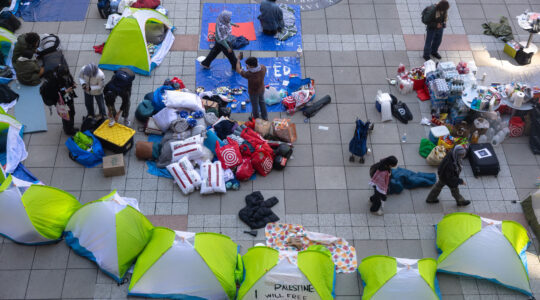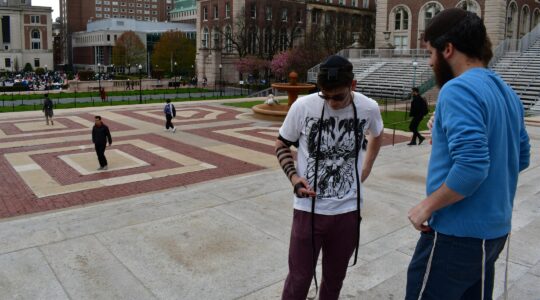SAN FRANCISCO (JTA) — December may be the cruelest month for intermarried families, with the annual tug-of-war between Christmas and Chanukah. But dilemmas surface again in the spring with Passover and Easter – especially when they fall in the same week, as happens this year.A new survey of interfaith families shows that the springtime holiday dilemma brings up the same issues as the Christmas-Chanukah conflict, with some subtle distinctions.The third annual Passover/Easter survey by InterfaithFamily.com, an organization that promotes intermarried couples making Jewish choices, looks at the holiday behaviors and attitudes of 236 interfaith couples raising their children solely as Jews. The survey was conducted in February, and results were released this week.It found, among other things, that whereas the Christian partners in such relationships are comfortable with Passover, and even look forward to it, the Jewish partners do not feel the same about Easter. Seventy-eight percent of the Christian respondents look forward to Passover, while only 13 percent of Jewish respondents said they look forward to Easter.And whereas no Christian respondents said they weren’t looking forward to Passover, 29 percent of the Jews said they weren’t looking forward to Easter. More than half, 51 percent, of the Jews said that participating in Easter celebrations made them somewhat or “very uncomfortable.””It’s interesting that both the Jewish and the non-Jewish respondents say they’re comfortable with and are anticipating Passover, but it’s a totally different picture with Easter,” says Micah Sachs, InterfaithFamily.com’s online managing editor. “The Jewish respondents have a high level of discomfort with Easter and are not looking forward to it.”Comparing those results to the group’s Christmas/Chanukah survey reveals a similar attitude on the part of Christian partners every December – 88 percent said they look forward to Chanukah, and none said they don’t look forward to it “at all.”But the survey shows that Jewish partners are much more accepting of Christmas celebrations than of Easter – 42 percent said they look forward to Christmas and only 8 percent don’t look forward to it “at all.”Ed Case, president and CEO of InterfaithFamily, points out that Easter and its resurrection story is the central component of Christian faith, which could have a lot to do with Jews’ reluctance to celebrate it. Christmas, however, can be approached as a historical story and a time for the family to get together. “While the culture in general, and probably many non-Jews, see Easter as secular, Jews still see it as a religious, potentially anti-Semitic holiday, but see Christmas as a more secular celebration,” Sachs says.While few of the intermarried families surveyed said their celebrations of Easter or Passover are deeply religious, many more said their Easter celebrations are entirely secular (67 percent) than the small number who said they treat Passover as entirely secular (2 percent). It’s clear, Sachs and Case maintain, that both partners in these interfaith families are more comfortable with the religious aspects of the Jewish holidays than the Christian ones.A second intriguing result of the Passover/Easter survey is the impact of the mother’s religion on an intermarried family. Numerous other studies indicate that a family’s religious tone is more often set by the mother than the father. But this survey shows that the mother’s religion has significant impact on an interfaith family’s Easter celebration, whereas it does not seem to affect the family’s participation in Passover.Easter activities are much more common in families where the mother isn’t Jewish.Fifty-three percent of the non-Jewish women responding said they will decorate Easter eggs (versus 16 percent of the Jewish women); 47 percent will take part in an Easter egg hunt (versus 19 percent of the Jewish mothers); and just 15 percent will not take part in any Easter celebrations (versus 33 percent of families with Jewish mothers). But participation in Passover is high whether it’s the father or the mother who is Jewish: 80 percent of families where the woman is not Jewish plan to attend a Passover seder, versus 76 percent of families where the woman is Jewish; 45 percent of non-Jewish women will host seders, versus 54 percent of Jewish women; and almost all will eat matzah and tell the Passover story.Sachs and Case emphasize that their survey results are not applicable to all intermarried families, but only to those that have chosen to create Jewish homes and raise Jewish children. They look at the holiday behaviors and attitudes of this group to bolster their organization’s position that intermarriage in and of itself does not preclude the raising of Jewish children. It’s up to the parents to create a Jewish home, and up to the local Jewish community to welcome or reject that family, they believe. In fact, they say, the intermarried families in their survey, who all have chosen to raise their children exclusively Jewish, exhibit similar Jewish behaviors as those found by the 2000-2001 National Jewish Population Survey in families where both parents are Jewish.”One quarter of these kids are going to Hebrew school more than once a week, the same number as in the NJPS,” Sachs says. “Seventy-six percent of the kids in our survey, and 79 percent of the NJPS kids, receive some kind of formal Jewish education. These families are ‘as Jewish’ as the average Jewish family.”





